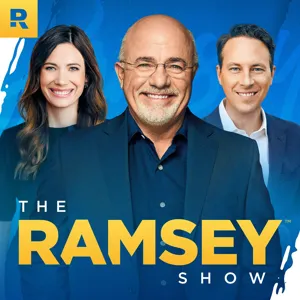Podcast Summary
The US dollar's role as global reserve currency: benefits and challenges: The US dollar's status as global reserve currency grants power for statecraft but also brings potential downsides, such as the desire for a weaker dollar for economic growth. Recent events, like the US response to Russia's invasion of Ukraine, have sparked discussions about potential alternatives.
The role of the US dollar as the global reserve currency brings both benefits and challenges. While it grants the US the power to use it as a tool of statecraft, there are downsides, such as the potential desire for a weaker dollar for economic growth. The US's response to Russia's invasion of Ukraine, including cutting off Russia from the dollar-based system, served as a recent catalyst for discussions about the power of the dollar and potential alternatives. This episode of Odd Lots also brought up the example of the US seizing Afghanistan's central bank reserves, highlighting that a dollar is not truly a tangible thing but rather a claim to capacity on the global dollar network. The US's ability to seize these reserves underscores the complex nature of the dollar as a global currency.
The Power and Politics of the US Dollar: The US dollar's role as the world's reserve currency grants the US significant power to control global financial flows and influence markets and democracy.
The US dollar, while currently the world's reserve currency, is not a tangible object but a digital entry in a computer system. This gives the US significant power to control global financial flows by deciding who has access to the dollar system and who doesn't. This topic, known as dedollarization, has been a recurring theme on Odd Lots, with guests like Zoltan Pozsar and Perry Merling. In her new book, "Paper Soldiers," Bloomberg senior Washington correspondent Solea Mohsen explores the history and implications of the weaponization of the dollar in shaping the global order. She was prompted to write the book after the events of January 6, 2021, when the role of the Treasury Department and the dollar in American democracy came into sharp focus. The book delves into the complexities of how treasury secretaries and other officials' words about the dollar can impact currency markets. For instance, former Treasury Secretary Robert Rubin's views on the dollar have long influenced traders' decisions. Trump's administration provides an interesting case study, as he expressed conflicting views on the desirability of a strong dollar. Overall, the book sheds light on the interconnectedness of democracy, markets, and the dollar.
Former President Trump's concerns about the strong dollar and US control over dollar network: Manipulating the dollar network can have unintended consequences, leading to market volatility and potential shutdowns of industrial facilities. Considering the broader implications is crucial to avoid negative ripple effects on global markets and individual businesses.
Former President Donald Trump recognized the downside of the strong dollar policy for certain sectors of the US economy, particularly manufacturing, during his presidency. He expressed concerns about dedollarization, adding weight to a global debate on the extent of America's control over the dollar network and its ability to regulate transactions. The US has learned the hard way that imposing sanctions can have unintended consequences, as seen in the 2018 sanctions on Oleg Deripaska, which led to market volatility and potential shutdowns of industrial facilities. The more recent sanctions against Russia in 2022 have also raised concerns about the ripple effects on global markets and individual businesses. These incidents highlight the importance of considering the broader implications when manipulating the dollar network and the need for a nuanced understanding of its reach and potential consequences.
The US Treasury's use of economic sanctions as a foreign policy tool: The US Treasury's intelligence-driven economic sanctions have grown in power due to technological advancements and increased political will, making them a cost-effective foreign policy alternative to diplomacy or military intervention.
The weaponization of the dollar as a tool for economic sanctions has evolved significantly since the aftermath of 9/11. Prior to that event, the Office of Foreign Assets Control (OFAC) at the US Treasury Department had limited capabilities in tracking illicit money flows and lacked political clout. However, post-9/11, the US realized it could use the dollar as a weapon to choke off financial resources for terrorists and other bad actors. This led to the creation of the Terrorism and Financial Intelligence Unit within the Treasury Department, making it the only finance ministry in the world with its own intelligence operation. The US Treasury's technological ability to track money flows and cut off access to the global financial system has grown exponentially, making economic sanctions a powerful tool in foreign policy. The political will to use economic sanctions has also increased, making them a cost-effective alternative to diplomacy or military intervention when diplomacy has failed.
US government sought real-time financial data after 9/11 attacks: The US government, in response to 9/11, negotiated with SWIFT for real-time access to international money transfer data to enhance financial security.
After the 9/11 attacks, the US government recognized the need for greater visibility into the global financial system to prevent future attacks. However, physical dollars moving through the system were difficult to monitor, and financial institutions were required only to report suspicious transactions. The US government turned to SWIFT, a financial messaging system based in Belgium, which had the data needed to track international money transfers in real time. SWIFT initially resisted sharing this information with the US government, but after the attacks, negotiations began. Some central bank governors, including those from the Federal Reserve and the Bank of England, supported the idea, while others, like Alan Greenspan, initially opposed it due to privacy concerns. The US government's code name for the program was "Turtle," the opposite of SWIFT. The details of these negotiations were not made public until 2006.
The US dollar's special role in the global economy: The US dollar's 'exorbitant privilege' as the global reserve currency brings benefits to the US and rest of the world, including economic stability and the ability to issue debt.
The US dollar's special position in the global economy, often referred to as the "exorbitant privilege," has significant benefits for the US but also advantages for the rest of the world. This privilege was established during the Bretton Woods agreement in 1944, when the US emerged as a global superpower after World War II. The dollar was crowned as the reserve asset, and countries relied on it as a safety net for economic integration and stability. The US helped create institutions like the World Bank and the International Monetary Fund, which further strengthened the dollar's role. Over the decades, as the US consolidated its power and globalization increased, the dollar became a safe haven during crises. The US's ability to issue dollar-denominated debt and fund various projects is partly due to this special position. However, it's important to remember that this privilege also comes with responsibilities, such as maintaining the stability of the global financial system.
The US dollar's role as the world's reserve currency: benefits and risks: The US dollar's status as the world's reserve currency brings economic stability and facilitates global transactions, but also subjects countries to US rules and regulations.
The dominance of the US dollar as the world's reserve currency comes with both benefits and risks. While holding dollars offers economic stability and the network effect of global transactions, it also means submitting to the US's ability to enforce its rules and regulations. This dynamic was highlighted during events like the 2022 Afghanistan sanctions, which underscored the risks associated with the dollar's special status. Despite the US's unipolar standing in the world economy, the dollar's position is not solely a result of American dominance but rather a result of international cooperation, as seen in the case of SWIFT and various central banks. The degree of cooperation and potential vulnerability of this consensus in the current day remains an open question.
Shift in currency market dynamics due to US policies: The US Treasury Department's currency reports now face new challenges due to the complexity and size of currency markets and the diminished US global standing, with ongoing debates about sanctions against Russia and the dollar's role further shaping the evolving currency landscape.
The ongoing conversation about a potential post-dollar era and currency market intervention has been a recurring theme for decades, but the current geopolitical landscape, influenced by Trump's populist policies and actions, has shifted the trajectory. The US Treasury Department's currency policy reports, which once focused on potential manipulator designations, now face new challenges due to the complexity and size of currency markets and the diminished standing of the US on the global stage. The ongoing debate about the effectiveness of sanctions against Russia and the defensive posture of the current administration regarding the dollar's role further underscores the evolving dynamics of currency markets and geopolitical power.
Geopolitical events challenging US dollar's role as world's reserve currency: Despite geopolitical events, the US dollar's dominance as the world's reserve currency is likely to continue due to political stability, democratic institutions, and network effects.
The strength of the US dollar and the dominance of the US in global finance are closely tied to political stability and the rule of law in the United States. The discussion highlighted several instances where geopolitical events led countries to question their reliance on the US dollar and consider alternatives. However, the lack of political stability and democratic institutions in some of these countries makes it unlikely that they will successfully challenge the dollar's role as the world's reserve currency. The author, Saleh Mohsen, expressed optimism that the US will continue to be a stable democracy and remain the safe haven for investors during global crises. The network effects and consensus building around the dollar have contributed to its hegemony, and political instability in other countries may prevent them from effectively challenging it.
The Shifting Financial Landscape: US Dollar Dominance and Alternatives: Post-9/11, the US exerted greater financial control, but concerns about overexertion and alternatives have emerged. Creating an alternative financial system is difficult, especially for unstable regimes.
The financial dominance of the US dollar and the ability to monitor global financial flows have undergone significant changes since the turn of the century. The events of 9/11 marked a turning point, leading to increased aggressiveness and monitoring capabilities by the US. However, this shift has also raised concerns about potential overexertion of control and the need for alternatives. Building a network for an alternative financial system is a challenging task, especially for dictators or countries with internal instability. The current financial system feels both inevitable and mind-blowing, as it represents a significant departure from past consensus and coordination among world leaders. Matt Levine and Katie Greif's new podcast, Money Stuff, offers further insights into Wall Street finance and related topics.






